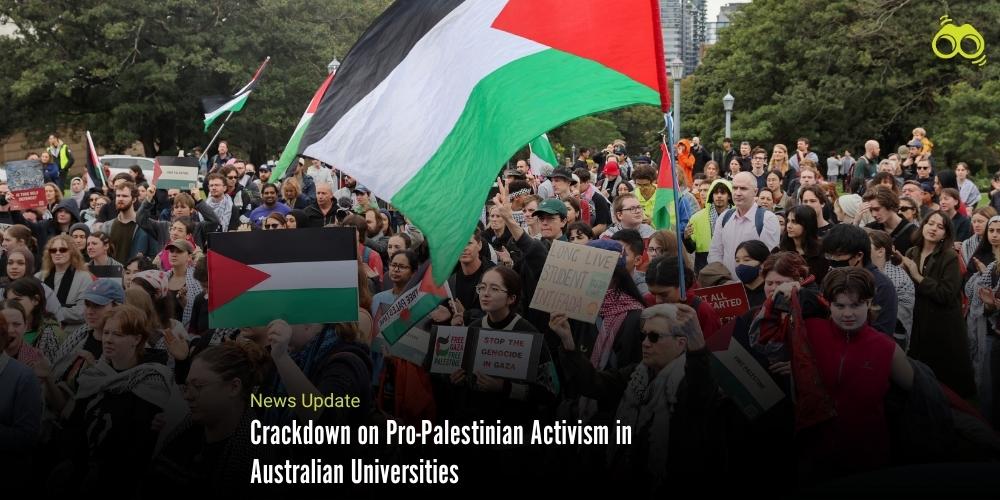Concerns Grow as Universities Tighten Control Over Political Expression
Academic Freedom at Risk: Critics Condemn Suppression of Pro-Palestinian Advocacy
Universities have traditionally been regarded as spaces for free speech, intellectual debate, and political engagement. However, reports indicate that several Australian institutions are imposing increasingly restrictive measures to curb pro-Palestinian activism on campuses, raising concerns about academic freedom and the right to protest. Authorities at the Universities of Sydney, Melbourne, and Western Australia have been stringent in their approach, with critics arguing that their monitoring and control tactics are intrusive and overly restrictive. Some claim that these measures are eroding universities’ fundamental role as places for open political discourse and democratic participation.
According to Educational Researchers for Palestine, despite universities publicly endorsing free speech, many institutions are employing similar control tactics to limit discussions on Israel-Palestine. Critics argue that this reflects a loss of ethical direction, as universities appear to be yielding to political pressure and avoiding engagement with the humanitarian crisis in Gaza and the West Bank. This, they argue, compromises academic integrity and stifles open inquiry. Further concerns have been raised about a growing climate of fear and self-censorship within Australian universities. Faculty members fear career repercussions, while students worry about disciplinary actions and a lack of institutional support. Individuals of Palestinian, Arab, or Muslim backgrounds reportedly feel particularly vulnerable, leading to cancelled events and restricted expression.
Students advocating for Palestine face strict limitations on campus visibility, including bans on promoting events in classrooms, posting materials, or preparing banners in shared spaces. Non-university affiliates risk trespass notices if they participate in protests. Additionally, university administrations have reportedly removed pro-Palestinian visuals from campuses, with critics alleging that broad definitions of antisemitism are being used to censor expressions of solidarity. Beyond spatial restrictions, activities such as club meetings, film screenings, lectures, and fundraising related to Palestine are discouraged, with approval processes viewed as bureaucratic tools of censorship. Academics reportedly avoid discussing sensitive topics such as human rights and colonialism due to fears of scrutiny. Meanwhile, digital surveillance of staff and students has allegedly intensified, particularly concerning pro-Palestinian activism.
Reports suggest that individuals involved in pro-Palestinian advocacy have faced disciplinary actions, including warnings, suspensions, and expulsions, with peaceful protests sometimes treated as security threats. Critics further allege that universities fail to protect activists from external threats, while simultaneously penalising them internally. Some academic staff have reportedly had their funding revoked or have been placed under institutional monitoring due to their stance. Many of these restrictive measures have been framed as efforts to maintain a safe environment for Jewish staff and students. However, critics argue that this selective emphasis on antisemitism disregards or contributes to anti-Palestinian racism by silencing Palestinian voices.
Universities have also been accused of shifting the narrative from Palestinian human rights to debates around antisemitism, using vague definitions to categorise speech as threatening. This, critics claim, diverts attention from core issues such as justice, occupation, and state violence. The broad “working definition of antisemitism” adopted by Universities Australia in February 2025 has heightened concerns that these measures could further suppress discussions on Palestinian rights.
Observers argue that Australian universities have missed a vital opportunity to demonstrate ethical leadership. Instead of resorting to censorship and silence, institutions could have taken steps to support displaced academics, engage with educational institutions in Gaza, and use their platforms to raise awareness and foster solidarity. By failing to act, critics contend, universities have compromised their core values of academic freedom, compassion, and social responsibility. As institutions continue to tighten restrictions, concerns grow that universities may be fundamentally shifting away from their traditional role as spaces for open dialogue and intellectual engagement.
Editor’s Note:
Universities should be places where ideas can be freely explored, debated, and challenged. Yet, the growing restrictions on pro-Palestinian activism in Australian universities raise serious concerns about academic freedom and the right to peaceful protest. Instead of fostering open dialogue, institutions appear to be tightening control, making students and faculty fear consequences for speaking up. Campus safety matters, yet censorship and heavy surveillance foster a culture of silence, hindering vital conversations on human rights and world affairs. Removing pro-Palestinian imagery, limiting student actions, and closely supervising academic work isn't merely procedural; it dictates whose voices are heard and whose are marginalised. They could use their influence to support intellectual debate, stand up for human rights, and ensure that no group feels excluded or silenced. Right now, they are failing that responsibility, and the consequences could last for years to come.
Skoobuzz believes that this troubling trend highlights a critical failure on the part of universities to uphold their core values of free expression and social justice, risking long-term damage to academic integrity and community trust.














0 Comments (Please Login To Continue)